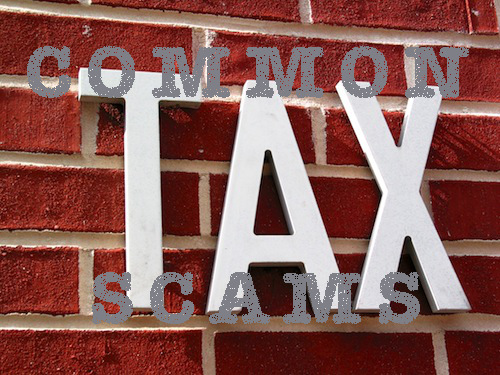It’s tax season which typically means hours gathering your data and slogging through the year’s records.
Most don’t look forward to tax season, but the usual tax time headache can get even worse if you’re the unfortunate victim of a tax scam.
Every year, there seems to be more ways scammers find to rob you of your tax refund. According to CNNMoney, nearly 2/3rds of Americans get a tax refund, and the average refund in 2011 was more than $3,000.
With that kind of money at stake, it’s no wonder scammers continue to find creative ways to get their hands on your cash.
As you prepare to file your taxes this year, be aware of these four common tax return scams:

1. The thief files your tax return as YOU.
This is a relatively new and clever tax scam. The thief gets your social security number, which, these days with security breaches, is not that hard to do, and files the tax refund as you. The thief opts to have the return put on a third party debit card, which is hard to trace. He gets the refund within 10 days, and meanwhile, you may have not even filed your refund yet.
You may wonder how they can do this when they don’t have your W-2s. According to AARP, all thieves need “is your name, Social Security number and birth date–and a computer. NO W-2s or other tax documents requried. They just make all that information up.”
When you file your tax return, you’ll get a note from the IRS that this is a duplicate return, and so begins the long process of untangling this mess. You will still get your return, but it will likely take many months for the problem to be sorted out.
Because the IRS turns around tax refunds so quickly (usually within 10 days of receiving the return), they don’t have the chance to verify that every tax return is legit. Thieves know this and are walking away with millions.
How to Prevent This: There are two main ways to prevent this type of scam. First, file your taxes as quickly as possible, before a thief has time to file as you. Second, do your best to keep your personal information, including your social security number, private. However, even if you are vigilant, there’s still a chance a data breach will leave you vulnerable.
2. The tax preparer skims your tax return.
Most people go to a tax preparer because they feel overwhelmed by the process of filing taxes. While there are many excellent tax preparers out there, there are also devious ones that are looking to get their hands on your refund. They do this by skimming part of your refund into their account.
The Huffington Post warns that some tax preparers “have been found to charge unnecessarily large fees or even take a portion of client refunds.”
How to Prevent This Scam: The best way to prevent this is to ask others which tax preparer they use. If you have satisfied friends and family giving referrals, you should be fine. Also, enter the preparer’s name and check the web to see if there have been any complaints.
3. You receive an e-mail from the IRS.
This scam has been around a bit longer, so hopefully people are wising up and not falling for it.
You get an e-mail from the IRS saying there is a problem with your tax return and asking you to click on a link to enter the correct information. The only problem is that the e-mail isn’t from the IRS; it’s from a thief and he is directing you to his website. Once you enter your information, he has the knowledge he needs to steal your tax refund.
How to Prevent This Scam: First, never click on a link in your e-mail. If you have concerns about your tax refund after getting this e-mail, call the IRS instead. According to the IRS, “the IRS will never contact you in any way other than the mail, including about your refund status. If you get an email claiming to be from the IRS, it’s a scam. Report it to the IRS through their website.”
4. You enter your data into an illegitimate website.
People are eager to know when their refund will get to them, so they check the site that tracks their refund.
The problem? If they don’t know the exact address, they may stumble upon a scammer’s fraudulent site and enter their personal data to track their refund.
How to Prevent This Scam: Know how to check your refund. The safest way is to call the IRS’ tax refund status hotline at 1-800-829-1040. Or, you can check your refund online at the IRS’ website.
Finally
If you’re getting a refund this tax season, you’re likely anxious to receive it.
Just remember that scammers are just as eager to steal your refund and have invented many creative ways to do just that. Learning their scams and how to avoid falling for them is the first step in protecting your refund.
Hi Glen,
Thank you for sharing these. I wish a thief did my returns this year as I owed for the first time ever.
Haha. I hear you, we’ve owed before too.
Really scary when you realized someone filed your income tax on your behalf. I mean, what more could they do with the information? If ever your tax refund was delayed, you can check it online with the IRS. I’ll take note of some of these tips. Thanks.
Definitely a good list. As I work with a network of CPAs to help my clients with their taxes, I cannot agree more on how important it is to have a trustworthy tax preparer who has your best interest in mind.